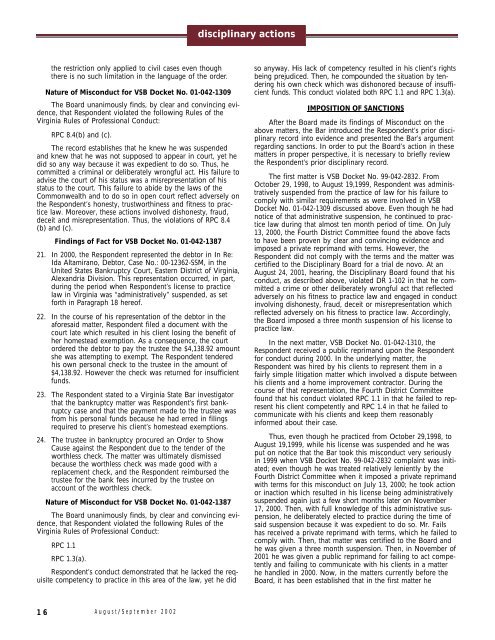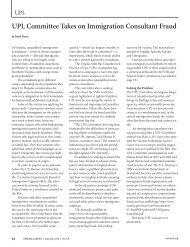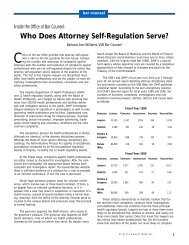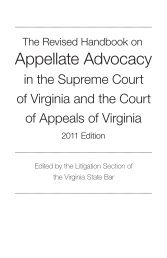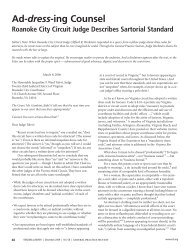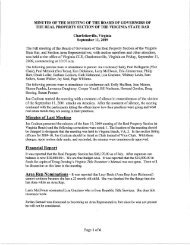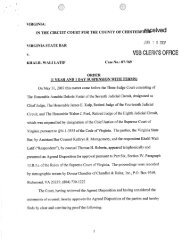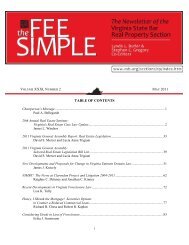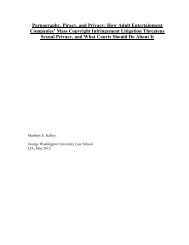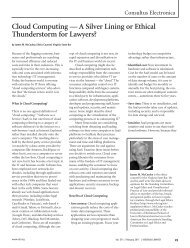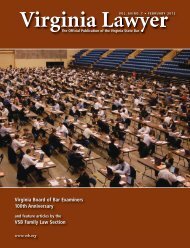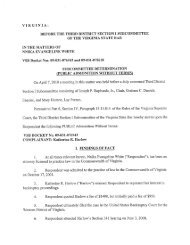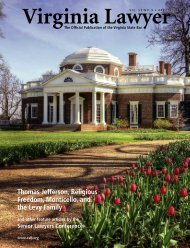Disciplinary Board Disciplinary Actions - Virginia State Bar
Disciplinary Board Disciplinary Actions - Virginia State Bar
Disciplinary Board Disciplinary Actions - Virginia State Bar
You also want an ePaper? Increase the reach of your titles
YUMPU automatically turns print PDFs into web optimized ePapers that Google loves.
1 6<br />
the restriction only applied to civil cases even though<br />
there is no such limitation in the language of the order.<br />
Nature of Misconduct for VSB Docket No. 01-042-1309<br />
The <strong>Board</strong> unanimously finds, by clear and convincing evidence,<br />
that Respondent violated the following Rules of the<br />
<strong>Virginia</strong> Rules of Professional Conduct:<br />
RPC 8.4(b) and (c).<br />
The record establishes that he knew he was suspended<br />
and knew that he was not supposed to appear in court, yet he<br />
did so any way because it was expedient to do so. Thus, he<br />
committed a criminal or deliberately wrongful act. His failure to<br />
advise the court of his status was a misrepresentation of his<br />
status to the court. This failure to abide by the laws of the<br />
Commonwealth and to do so in open court reflect adversely on<br />
the Respondent’s honesty, trustworthiness and fitness to practice<br />
law. Moreover, these actions involved dishonesty, fraud,<br />
deceit and misrepresentation. Thus, the violations of RPC 8.4<br />
(b) and (c).<br />
Findings of Fact for VSB Docket No. 01-042-1387<br />
21. In 2000, the Respondent represented the debtor in In Re:<br />
Ida Altamirano, Debtor, Case No.: 00-12362-SSM, in the<br />
United <strong>State</strong>s Bankruptcy Court, Eastern District of <strong>Virginia</strong>,<br />
Alexandria Division. This representation occurred, in part,<br />
during the period when Respondent’s license to practice<br />
law in <strong>Virginia</strong> was “administratively” suspended, as set<br />
forth in Paragraph 18 hereof.<br />
22. In the course of his representation of the debtor in the<br />
aforesaid matter, Respondent filed a document with the<br />
court late which resulted in his client losing the benefit of<br />
her homestead exemption. As a consequence, the court<br />
ordered the debtor to pay the trustee the $4,138.92 amount<br />
she was attempting to exempt. The Respondent tendered<br />
his own personal check to the trustee in the amount of<br />
$4,138.92. However the check was returned for insufficient<br />
funds.<br />
23. The Respondent stated to a <strong>Virginia</strong> <strong>State</strong> <strong>Bar</strong> investigator<br />
that the bankruptcy matter was Respondent’s first bankruptcy<br />
case and that the payment made to the trustee was<br />
from his personal funds because he had erred in filings<br />
required to preserve his client’s homestead exemptions.<br />
24. The trustee in bankruptcy procured an Order to Show<br />
Cause against the Respondent due to the tender of the<br />
worthless check. The matter was ultimately dismissed<br />
because the worthless check was made good with a<br />
replacement check, and the Respondent reimbursed the<br />
trustee for the bank fees incurred by the trustee on<br />
account of the worthless check.<br />
Nature of Misconduct for VSB Docket No. 01-042-1387<br />
The <strong>Board</strong> unanimously finds, by clear and convincing evidence,<br />
that Respondent violated the following Rules of the<br />
<strong>Virginia</strong> Rules of Professional Conduct:<br />
RPC 1.1<br />
RPC 1.3(a).<br />
Respondent’s conduct demonstrated that he lacked the re quisite<br />
competency to practice in this area of the law, yet he did<br />
A u g u s t / S e p t e m b e r 2 0 0 2<br />
disciplinary actions<br />
so anyway. His lack of competency resulted in his client’s rights<br />
being prejudiced. Then, he compounded the situation by tendering<br />
his own check which was dishonored because of insuff icient<br />
funds. This conduct violated both RPC 1.1 and RPC 1.3(a).<br />
IMPOSITION OF SANCTIONS<br />
After the <strong>Board</strong> made its findings of Misconduct on the<br />
above matters, the <strong>Bar</strong> introduced the Respondent’s prior disciplinary<br />
record into evidence and presented the <strong>Bar</strong>’s argument<br />
regarding sanctions. In order to put the <strong>Board</strong>’s action in these<br />
matters in proper perspective, it is necessary to briefly review<br />
the Respondent’s prior disciplinary record.<br />
The first matter is VSB Docket No. 99-042-2832. From<br />
October 29, 1998, to August 19,1999, Respondent was administratively<br />
suspended from the practice of law for his failure to<br />
comply with similar requirements as were involved in VSB<br />
Docket No. 01-042-1309 discussed above. Even though he had<br />
notice of that administrative suspension, he continued to practice<br />
law during that almost ten month period of time. On July<br />
13, 2000, the Fourth District Committee found the above facts<br />
to have been proven by clear and convincing evidence and<br />
imposed a private reprimand with terms. However, the<br />
Respondent did not comply with the terms and the matter was<br />
certified to the <strong>Disciplinary</strong> <strong>Board</strong> for a trial de novo. At an<br />
August 24, 2001, hearing, the <strong>Disciplinary</strong> <strong>Board</strong> found that his<br />
conduct, as described above, violated DR 1-102 in that he committed<br />
a crime or other deliberately wrongful act that reflected<br />
adversely on his fitness to practice law and engaged in conduct<br />
involving dishonesty, fraud, deceit or misrepresentation which<br />
reflected adversely on his fitness to practice law. Accordingly,<br />
the <strong>Board</strong> imposed a three month suspension of his license to<br />
practice law.<br />
In the next matter, VSB Docket No. 01-042-1310, the<br />
Respondent received a public reprimand upon the Respondent<br />
for conduct during 2000. In the underlying matter, the<br />
Respondent was hired by his clients to represent them in a<br />
fairly simple litigation matter which involved a dispute between<br />
his clients and a home improvement contractor. During the<br />
course of that representation, the Fourth District Committee<br />
found that his conduct violated RPC 1.1 in that he failed to represent<br />
his client competently and RPC 1.4 in that he failed to<br />
communicate with his clients and keep them reasonably<br />
informed about their case.<br />
Thus, even though he practiced from October 29,1998, to<br />
August 19,1999, while his license was suspended and he was<br />
put on notice that the <strong>Bar</strong> took this misconduct very seriously<br />
in 1999 when VSB Docket No. 99-042-2832 complaint was initiated;<br />
even though he was treated relatively leniently by the<br />
Fourth District Committee when it imposed a private reprimand<br />
with terms for this misconduct on July 13, 2000; he took action<br />
or inaction which resulted in his license being administratively<br />
suspended again just a few short months later on November<br />
17, 2000. Then, with full knowledge of this administrative suspension,<br />
he deliberately elected to practice during the time of<br />
said suspension because it was expedient to do so. Mr. Fails<br />
has received a private reprimand with terms, which he failed to<br />
comply with. Then, that matter was certified to the <strong>Board</strong> and<br />
he was given a three month suspension. Then, in November of<br />
2001 he was given a public reprimand for failing to act competently<br />
and failing to communicate with his clients in a matter<br />
he handled in 2000. Now, in the matters currently before the<br />
<strong>Board</strong>, it has been established that in the first matter he


